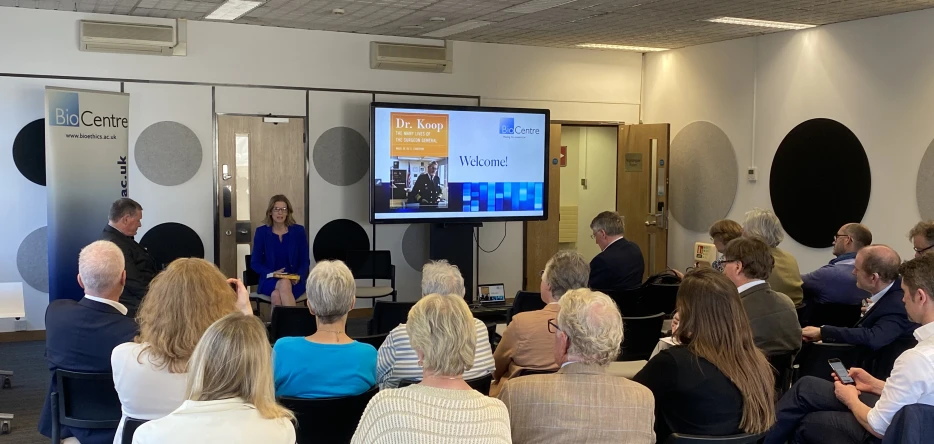About Us
Go to section:

Go to section:
BioCentre began as the Medical Ethics Project in the 1980s in response to public concern over fresh challenges to ethics and policy resulting from emerging technologies. Several events were convened (on in vitro, AIDS, infanticide, PVS) in London and Edinburgh, including a lecture tour in 1986 by then US Surgeon General C. Everett Koop, and books published. It was therefore one of the earlier centres active in the world of bioethics and biopolicy, and its first public event was a major conference in 1984 convened in London and Edinburgh to address the Warnock Report (which became the basis for UK policy on in vitro fertilisation and embryo research) shortly after its publication. Participants included Professor Ian Donald, pioneer of ultrasound, Professor Thomas F. Torrance, Scotland's leading theologian of the late twentieth century and a member of the Warnock Committee, Professor John Marshall.
The project evolved into the Centre for Bioethics and Public Policy (CBPP) in 1991 based in Westminster, London where it sought to engage with leading thought leaders and policy makers on matters of British biopolicy. It transitioned into an independent think tank in 2006, maintaining its commitment to ethical discourse on emerging technologies.

Today, BioCentre is a think tank which has a proven and successful track record in helping to host the conversation surrounding key issues in bioethics and emerging technologies through strategic conferences, symposia and publications.
Over years BioCentre has collaborated with the following:
The Biochemical Society
Centre for Applied Global Citizenship and the Science, Medicine and Society Network, University College London
Institute for Gerenontology, King’s College London
London Science Museum’s Dana Centre
Royal Society of Chemistry
Saving Faces: The Facial Surgery Research Foundation
European Association of Centres of Medical Ethics (EACME)
Participating organisations at BioCentre events have included the following:
Arts Catalyst
Bloor Research for RFID
Centre for Applied Global Citizenship, University College London
Centre for Bioethics and Emerging Technologies, St Mary’s University College
Centre for Business Relationships, Accountability, Sustainability and Society (BRASS) at Cardiff University
Centre for Ethics in Medicine, Bristol University
Chair of the House of Commons Science & Technology Select Committee
Cognitive Science at Middlesex University
ePlanet Ventures
European Union FP7 projects (various).
Faculty of Social Science, Department of Political Science, University of Vienna, Austria
Future of Humanity Institute, Oxford University
Gúna Nua Theatre Company, Dublin
Institute for Science, Ethics, and Innovation, University of Manchester
Institute of Gerontology, King’s College London,
International Organisation for Standardisation (ISO)/TC229, Nanotechnologies
Lloyd's of London
Medical Anthropology, University of California at Berkeley, USA
NanoManufacturing Institute, University of Leeds
Nanotechnologies Industries Association
Nuffield Council on Bioethics
Research Councils UK
Royal College of Art, Design Interactions
Royal Academy of Engineering
Saving Faces: The Facial Surgery Research Foundation
School of Computer Science at University of Hertfordshire
School of Social and Political Science, University of Edinburgh
Science Council
Scottish Council on Human Bioethics
Sheffield Law School
SPRU (science and technology policy research unit), University of Sussex
Strategies for Engineered Negligible Senescence (SENS) Foundation
Swiss National Advisory Commission on Biomedical Ethics
TELOS (Centre for the study of Technology, Ethics and Law in Society), King's College London
United Nations Education, Scientific and Cultural Organisation (UNESCO)
University of Cambridge
University of Surrey
University of West of Scotland
2020health.org
Government agencies and departments
Department of Health; Defense, Science and Technology Laboratories (Dstl), Ministry of Defense, Portdown; Human Fertilisation & Embryology Authority; Human Tissue Authority
Embassies and diplomatic missions
Austria, Bolivia, Brazil, China, Equatorial New Guinea, France, Hungary, Indonesia, Pakistan, Portugal, Russia, Serbia, Saudi Arabia, Venezuela.
BioCentre symposia have attracted a diverse range of people including the following:
Academics from UK universities (professors, doctors).
Postgraduate research students.
Healthcare professionals (doctors, nurses).
Members of the public.
Public policy representatives.
Think tank specialists.
Artists, designers and public engagement specialists.
Civil society leaders.
Members of learned societies.
Freelance writers & media representatives
Lawyers.
Business and industry representatives.
Parliamentarians and representatives from their offices.
Government department representatives.
Representatives from the European Commission
Nigel Cameron has written about history, bioethics, theology, the values of the medical profession, and corporate social responsibility. He has served as a hospital consulting ethicist, was founding editor of the journal Ethics and Medicine, and a board member of 2020health.org and BioCentre. He has testified before committees of the US Congress and the European Union, served as a member of US diplomatic delegations to United Nations agencies on health-related issues, and was a US Government candidate to be UN Special Rapporteur for the Right to Health. He was appointed by Secretaries of State of both parties to serve four terms as a Commissioner of the US National Commission for UNESCO, and chaired its Committee on Social and Human Sciences.
Nigel was among Nobel Laureates and other internationally acclaimed figures from a variety of areas who came together to participate in "The unknown, 100 years from now" conference to think through the world our children and grandchildren will inhabit 100 years from now. Watch ‘Nigel Cameron on ‘the human question’ in 2115′.
Matt James is Associate Professor of Bioethics and Medical Law at St Mary’s University, Twickenham. With over two decades of experience in Westminster and Whitehall, he has led strategic, evidence-based research influencing national policy, particularly on health and emerging technologies. Formerly a parliamentary researcher and senior think tank analyst, Matt currently serves on the Biometrics and Forensic Ethics Group, an advisory non-departmental public body advising the UK Home Office on ethical issues surrounding biometric data, forensic materials, and AI systems. His expertise bridges academic insight and public policy, shaping ethical governance in complex, technology-driven domains.
Julia Manning is a pioneer in healthcare, a Hon. Professor of Practice in Computer Science and an expert in critiquing technology solutions to make life easier for clinicians and improve patient safety and self-care. She is committed to humane technology, embedding responsibility, trust, dignity and personal control throughout design, and to wider health ecosystem governance. Her current research interest is on the 'external' AI responsibility issues - the potential impact on society and community, in particular Sustainability (environment), Trust (relationships), Education (expertise and liability) and Materialism (reductionism).
John’s background is as a consultant neonatologist and academic researcher focussing on the mechanisms, treatment and prevention of brain damage in newborn infants. He is now engaged in addressing new ethical, philosophical and theological challenges caused by advances in medical science and technology. He is also fascinated by the issues raised by rapid advances in AI and robotics, and the interface between cutting-edge science and Christian faith. John’s academic title is Emeritus Professor of Neonatal Paediatrics, Ethics & Perinatology at University College London. He is also senior researcher at the Faraday Institute for Science and Religion, Cambridge.